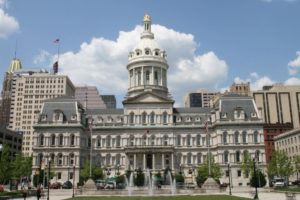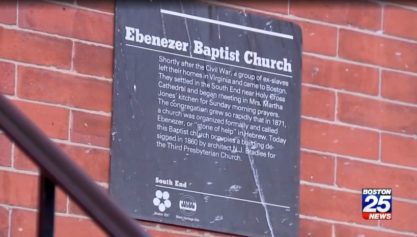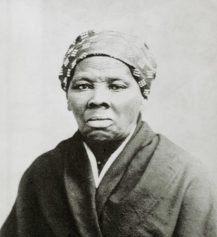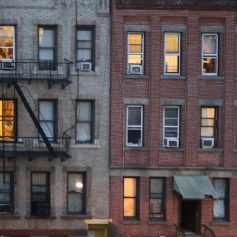
Baltimore City Hall, Credit: Wikipedia
What are Black elected officials doing to help their Black constituents? What is the purpose and value of Black power if there are Black faces in high places in city government, yet the old systems of institutional racism remain in place and the economic conditions of Black people do not improve?
The most recent events in Baltimore raise these questions. Last Friday, Catherine Pugh, the city’s new mayor, vetoed a measure passed by the City Council that would have doubled the minimum wage to $15 per hour by 2022. The move comes as other cities increase their minimum wage, in the face of a growing national movement for a $15 minimum wage and successful efforts in cities such as New York, the District of Columbia, Seattle, Los Angeles, San Francisco and the state of California itself. In keeping with Martin Luther King’s fight for economic and racial justice immediately before his assassination, when he supported striking sanitation workers in Memphis, Black Lives Matter has joined the national Fight for $15 movement, as AP reported.
In a press conference, Pugh elaborated on her reasons for vetoing the wage hike, citing the need to “take into consideration all of the needs of all the people of Baltimore.”
“I’ve had conversations with every single county executive, my cohorts in various jurisdictions … and all of them said, ‘You know, Catherine, if you push for the bill or sign the bill that’s before you, probably we would benefit. But we are rooting for you and we think the fight should continue at the state level,’” Pugh said. “So, I believe it is in the best interests of the city that we follow the state, that we are on an increase currently … which, again I reiterate, will take place this July 1, 2017, and then again in 2018.
“So, for those reasons and the economic impact that I think this will have on the city, making us the hole in the donut, it is not appropriate at this time that I would sign this bill. So, I am vetoing this bill,” she said.
The Pugh administration, whose decision was met with praise from business interests and feelings of disappointment and betrayal from unions and community people, claims the policy change would have cost the city $116 million over seven years, as The Baltimore Sun reported. The city faces a $130-million shortfall for the public schools, a $20 million deficit and new obligations because of the police consent decree with the U.S. Department of Justice.
For a myriad complex reasons, predominantly Black cities such as Baltimore have Black officials in power, controlling the levers of government from the top down, yet economic inequality, systemic racism, gentrification and institutional discrimination have taken their toll. Baltimore has faced years of economic exploitation, redlining and discrimination in mortgage lending, with banks cheating Black residents based on race even to this day. Police brutality against Freddie Gray and other Black victims has continued under Black leadership, as has the removal of poor Black residents from their homes, making Baltimore the national leader in evictions.
“I think Baltimore shows the sophistication of white supremacy and how it operates,” said Dayvon Love, activist and co-founder of the grassroots group Leaders of a Beautiful Struggle, in a 2015 interview with Melissa Harris-Perry on MSNBC. “How it takes Black figures, puts them in institutional positions to give the veneer of justice, when really the same institutional arrangement exists.”
In Baltimore and elsewhere around the nation, Black mayors have taken different approaches to Black power and serving and addressing the needs of the Black community. While some mayors such as the late Maynard Jackson in Atlanta and Chokwe Lumumba in Jackson, Miss., were known for policies that embraced Black economic empowerment, other Black mayors have shied away from the centrality of race, while still others were sent to prison for using their position to personally enrich their bank accounts. Some examples include Sharpe James in Newark, Ray Nagin in New Orleans and Kwame Kilpatrick in Detroit.
Similarly, Baltimore’s leadership has been a mixed bag. Kurt Schmoke, Baltimore’s city’s first elected Black mayor, advocated for economic development and drug decriminalization and enlisted the Nation of Islam with contracts to perform security in public housing. A white mayor on his way to becoming governor of Maryland, Martin O’Malley became known for zero-tolerance policing, including unlawful detentions, mass arrests for minor offenses such as loitering and denying elderly prisoners parole, as Think Progress reported. Mayor Sheila Ann Dixon was found guilty of embezzlement for stealing gift cards intended for poor Baltimore residents.
Once a rising star, Dixon’s successor, former Mayor Stephanie Rawlings-Blake, was cited for poor handling of the police violence problem and the underlying issues of Black deprivation and lack of opportunity in Baltimore. She faced harsh criticism for referring to Black protesters as “thugs” in the wake of the Freddie Gray killing.
Even as a mayoral candidate, Pugh has faced criticism for not wanting to confront racial disparities in a city whose racial inequality problem, part of a national crisis, is often on the extreme end of the scale.
.@PughForMayor, our city has systemic racial disparities. Are you afraid to talk about racism? Why/how this ad?https://t.co/oV93ZXFsSo
— deray mckesson (@deray) March 31, 2016
Despite the failure of some big-city mayors, placing the blame solely at their feet is tantamount to reciting the narratives of right-wing think tanks. After all, there are fundamental issues at play, including years of government-sponsored segregation. The exodus of capital and manufacturing away from urban centers has left Black Democratic cities with diminished influence, having fallen out of favor in their state’s political landscape and held fiscal hostage by white Republican state houses.
Exacerbating matters is the role of gentrification, which has hollowed out Black populations and rendered Black folks strangers in their own neighborhoods. The higher rent, property values and taxes that come with gentrification have displaced Black people as white professionals encroach upon these historically melanated spaces. How Black elected officials respond to these socioeconomic forces will make all the difference in how the Black community will fare. If the end goal is to cater solely to the needs of business with tax breaks and other enticements, making way for tech startups and hipsters, then the Black community will lose out. Black political leadership must manage change without leaving their people behind. This means seeking input from the community, making affordable housing a priority and bringing about better communities with improved services and economic development that all can share. Communities can and should be revitalized, but without the harmful side effects of gentrification. It should not take the influx of white professionals for Black mayors to care about improving their cities.
Circling back to Baltimore, if a predominantly Black city — many of whose people are in dire straits — cannot afford a minimum-wage increase, then how can the city grow if its people are left earning pennies? Baltimore is a case study of a larger national issue.


